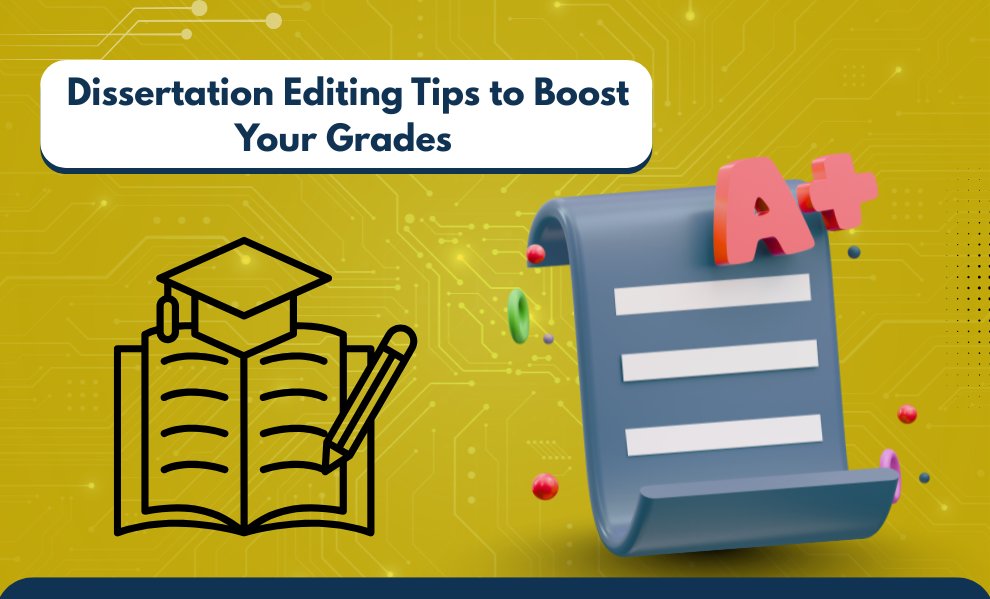BLOGS
Dissertation Editing Tips to Boost Your Grades

Dissertation Editing Tips to Boost Your Grades
Writing a dissertation is one of the most important milestones in your academic journey. After months of research, long nights, and multiple drafts, you finally reach the editing stage. But here’s the truth: even the best-written dissertation can lose marks if it’s not properly edited. That’s why we’ve created this simple guide with essential dissertation tips to help you edit like a pro and improve your grades.
Good dissertation writing isn’t just about presenting your research—it’s about presenting it clearly, correctly, and professionally. Whether you’re working on your own or using support for academic writing, the editing process is where your work can truly shine.
Why Editing Matters in Dissertation Writing:
Many students think their job is done once the writing part is over. But the truth is, editing is just as important. It helps to:
- Fix grammar and spelling errors
- Improve sentence structure
- Ensure arguments are clear and logical
- Maintain a consistent academic tone
- Meet formatting and referencing guidelines
Even small errors can hurt your overall grade, which is why editing is one of the top dissertation tips experts always recommend.
Top Dissertation Editing Tips:
Here are our top 10 easy-to-follow dissertation tips to boost your grades through better editing:
1. Take a Break Before You Edit
Once you finish writing, don’t jump straight into editing. Take at least a day or two to rest. This helps you come back with fresh eyes and a clearer mind.
2. Read Your Work Aloud
Reading aloud helps you catch awkward sentences, missing words, or repetitive ideas. It also helps improve the overall flow of your dissertation writing.
3. Check for Clarity and Structure
Every paragraph should support your main argument. Make sure:
- Each section has a clear purpose
- Transitions between paragraphs are smooth
- The introduction and conclusion connect well
Strong academic writing requires clear, logical progression of ideas.
4. Focus on Grammar and Punctuation
Even minor grammar issues can create a bad impression. Look out for:
- Sentence fragments
- Run-on sentences
- Incorrect punctuation
Use tools like Grammarly or ask someone skilled in academic writing to proofread it.
5. Consistency is Key
Check that your fonts, spacing, headings, and formatting style are consistent throughout. Whether you're using APA, MLA, or Harvard referencing, follow the guidelines exactly.
Formatting consistency is one of the most overlooked but crucial dissertation tips.
6. Eliminate Redundancy
Avoid repeating the same points or phrases. Be direct and to the point. Strong dissertation writing should be focused, not fluffy.
7. Improve Your Word Choice
Use academic vocabulary, but don’t overcomplicate your sentences. Words should be precise and appropriate for the topic. This is a core part of professional academic writing.
8. Fact-Check Your Data
Double-check facts, figures, names, and citations. One wrong number or misquoted source can affect the credibility of your work.
9. Review Your References Thoroughly
Make sure every in-text citation matches an entry in the bibliography. Use a citation manager or manually verify everything if needed.
This is one of the easiest dissertation tips that can help you avoid losing unnecessary marks.
10. Ask for Feedback
Before final submission, share your dissertation with a mentor, tutor, or professional editor. A second pair of eyes can catch mistakes you might miss.
If you're struggling, consider getting support from academic writing experts. They can help you refine your work without changing your original content.
How Dissertation Editing Improves Grades:
Proper editing improves your academic performance in several ways:
- Polished language improves readability
- Clear arguments show strong understanding
- Correct referencing avoids plagiarism
- A well-structured paper impresses examiners
When your dissertation writing is sharp and error-free, it creates a positive impact and sets you apart from others.
Common Mistakes to Avoid During Editing:
While editing, avoid these common errors:
- Editing while writing – it breaks your focus
- Ignoring feedback from your supervisor
- Relying only on spell-check tools
- Forgetting to check formatting guidelines
Using these dissertation tips, you can ensure your final draft is strong, polished, and ready to submit.
Final Thoughts:
Your dissertation is a reflection of your hard work and knowledge. Don’t let small editing mistakes pull down your grades. Use these easy and effective dissertation tips to make sure your writing is clear, professional, and impactful.
Remember, strong dissertation writing isn’t just about content—it’s about how that content is presented. If you ever feel stuck, there’s no harm in reaching out for help from academic writing professionals. A little support can go a long way in securing the grades you deserve.
